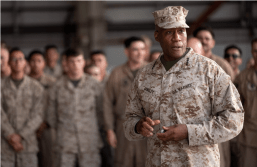U.S. military posture in Africa shifts while terrorist threats intensify

America’s military is supplying its closest counterparts in Africa that share overlapping security interests with vital information and intelligence assets — as numerous terrorist groups pose escalating threats and China deliberately expands its social and technological influence across the world’s second-largest continent.
In a telephonic press briefing Thursday, Marine Corps Gen. Michael Langley, commander of U.S. Africa Command, shared recent developments on the security conditions in the Sahel and elsewhere. He also shed light on his team’s new approach to enable more African-led solutions that confront contemporary risks, at a time when the continent is seen as an “epicenter” for terrorism, and insurgencies continue to make strides against local forces.
“We are leaning into empowerment over dependency. The United States is actively supporting African militaries through targeted training, advanced intel-sharing and help building institutions that can endure over time,” he told reporters.
Africom continues to evolve since it became a fully operational combatant command in 2008. The organization is primarily responsible for overseeing and conducting U.S. military operations, exercises, and security cooperation in its area of responsibility, which covers 53 African states that encompass more than 800 ethnic groups.
Building on policy shifts at the end of the Biden administration — and in alignment with President Donald Trump’s second-term vision to reduce the U.S. military’s global footprint in favor of homeland defense and a focus on the Indo-Pacific — Africom in recent months has been pulling back its physical presence around certain African nations and pushing those partners to assume more responsibility for their security.
Langley briefed reporters Thursday from Nairobi, Kenya, where he is participating in the annual African Chiefs of Defense Conference with representatives from 37 African countries. There, he’s been engaging in what he referred to as “powerful dialogue.”
“These conversations reaffirm something critical: African nations are not waiting to be saved. They’re stepping up to take control of their own futures,” he said.
One topic addressed during the conference sessions was African militaries’ intent to “match” technological capabilities to existing threats — and ultimately counter them across multiple domains.
“Most pressing was the information domain, and being able to operate at the speed of relevance and getting information out there to shape the operational environment, to shape the strategic environment. They see their ability to be able to do that for stability and security as important. And then also capabilities to protect the force, whether it be because of the asymmetric capabilities that violent extremist organizations can bring to bear, especially through [unmanned aerial systems] and drone technology. Our partners really want the leading edge-type technologies to protect the force,” Langley told DefenseScoop. “So, that forum gave the opportunity for a number of countries to talk about their initiatives going forward and how they can collaborate on sharing information and intelligence.”
While Africom pivots its approach to more directly assist its partners with becoming more self-sufficient, the commander noted, China is trying to “replicate every type of thing” the U.S. military is doing on the continent. Both China and Russia are also influencing African communities by offering short-term economic gains that could impact America’s national security interests in the years to come.
However, Langley said the command’s top strategic priority at this time involves countering threats to the U.S. homeland from terrorist factions — “the most dangerous of which are based in Africa.”
“Let me speak plainly about the threats we’re facing, especially in the Sahel region, including Mali, Burkina Faso and Niger. It is the flashpoint of prolonged conflict and growing instability. It is the epicenter of terrorism on the globe. Terrorist networks affiliated with ISIS and Al Qaeda are thriving, particularly in Burkina Faso, where the government no longer controls vast parts of its own territory,” Langley explained.
Extremist groups are simultaneously gaining ground across the Lake Chad regions as attacks are resurging.
“Throughout my travels across West Africa and through dialogue here at the conference, the concerns shared by my peers match my own. One of the terrorists’ key goals now is access to the West Coast of Africa. If they gain access to the vast coastline, they can diversify their revenue streams and evolve their tactics more easily — exporting terrorism to American shores. These terrorists conduct illicit activity like smuggling, human trafficking and arms trading. All these activities that fund their nefarious actions and destabilize the region,” Langley said.
“That’s why our coastal partners, like Ghana, Cote d’Ivoire and Benin, are relentlessly fighting along their northern borders to keep these threats at bay. Africom has and will continue to support them,” he added.
Since 2022, according to Langley, some terrorist factions have multiplied by up to fourfold around the continent.
In response to these threats and in line with its new strategic approach, Africom has been encouraging its international partners outside of Africa to increase burden-sharing. The command is also focused on helping its allies confront instability and other root causes of terrorism.
Further, early into his second administration, Trump made a policy change that empowered combatant commanders with expanded authorities that allow them to take faster action against “violent extremist organizations,” or VEOs.
“When [Defense Secretary Pete Hegseth] gave me guidance on Africa, he really said his number one priority for me to execute was to be able to hit ISIS, who is inextricably linked to global capabilities, and has a high aspiration and capabilities through their networks to attack the homeland. That was the first priority for me — and yes, with those authorities we’ve been able to execute operations to be able to turn them, degrade them, or affect deterrence of their operations. So, that’s in the name of him telling us to match capabilities to the threat,” Langley told DefenseScoop.





